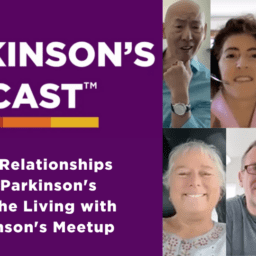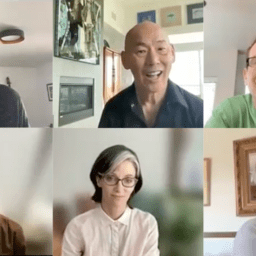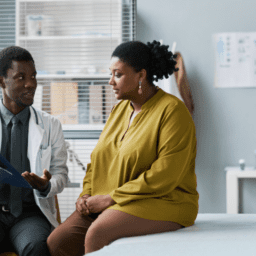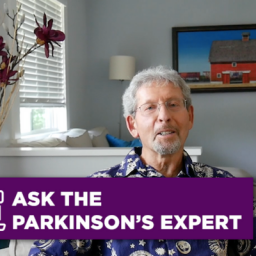You’ve been diagnosed with Parkinson’s. Now what? Do you tell people? If so, how, who, and when?
Whether you’ve been recently diagnosed, you’ve known for a while but don’t know how to tell people, or you’ve told people but aren’t satisfied with how it went, we hope this information will be useful. While not all of these situations will apply to you, we offer several strategies that can help you approach these potentially difficult conversations with more ease.
How to Prepare
It’s essential to take time to process your diagnosis in order to begin to understand what it means to you before telling others. Your spouse, or significant other, may have been with you when you received the diagnosis, but if not, then that is often the first person you confide in. Talk to your doctor, seek out information online from reputable sources, or reach out to other people with Parkinson’s, like our Ambassadors, to further prepare for the conversation with family, friends, and co-workers.
If you feel overwhelmed by your diagnosis, that may show when you tell others. That’s not always a bad thing, but it does depend on who you’re sharing the news with. Plan what you want to share and what you don’t want to share. Going into these conversations with a clear intention will give you agency and control, which can help put you and the person you’re talking to at ease. Plan, too, whether this communication will be in person, by phone, or via writing.
You can also prepare by thinking beforehand about the questions people may have and the answers you’ll give. For example, people may have misconceptions about Parkinson’s. They may think it’s fatal, that it just causes people to shake, or that it’s only an older person’s disease. So, you might want to prepare to respond to those myths with facts in order to avoid an overly emotional discussion that leaves you exhausted.
The people who care about you will want to know how they can help, and as a result, they may ask a long list of questions to show their concern for you. Again, you might think in advance about the answers you want to give to questions such as, “How can I help?” or “What will this mean for you in the long run?” Stay calm, be honest and forthright, but if it feels like too much, gently tell them so and suggest you talk about it more at another time.
Finally, plan out the timing. Although people may have noticed differences in you and reached their conclusions, your diagnosis may still be a shock to them. Make sure to allocate enough time for them to digest what is happening.
Talking to Your Spouse/Partner
As noted earlier, many people receive their Parkinson’s diagnosis with their partner sitting next to them; however, for those whose partner isn’t there, it’s important to tell them in a timely manner so that you can plan to move forward together. Even if you want to protect them from the truth, or you’re worried about how things might change, being open with them is critical.
If you’re having trouble getting the words out, think about how you would feel if they hid a diagnosis like this from you. Take the time you need to come to terms with your diagnosis, but don’t wait too long. You and your spouse can grow to understand Parkinson’s by asking questions and seeking information together. Your partner or significant other may also have pertinent questions that you haven’t thought of or offer a different perspective that can help you see your diagnosis in a new way.
Your partner can also become a resource and an advocate for you. Once you have told them, they can help facilitate further disclosures of your diagnosis. For example, it may be particularly challenging to tell your children, but telling them together can make it easier. They may also help you practice for future conversations and work out what you do and don’t want to share with specific people.
(Note: The above assumes you have a good relationship with your significant other, and that you trust them. We know that’s not always the case. We will address that topic in another post soon.)
Talking to Your Children
The way you share your diagnosis with your children will vary based on their age and maturity level. No one knows your children better than you do; so, you probably know what they can and can’t handle. Here are a few guidelines to help you have a productive conversation.
Children seven and under
Begin by mentioning symptoms they may have already noticed. You might ask, “Have you noticed that my hand is sometimes shaky, or that I’ve been walking slower? We talked to the doctor, and it turns out that I have something called Parkinson’s.”
Give them the basic facts. Let them share what they have noticed, talk about things that might change, and stress that your medication is helping you feel better. Be clear and consistent in what you say and don’t let the conversation go on too long. Remember, children pick up on a lot and will often mirror your demeanor. Maintain a positive attitude and make it okay for them to go on as before.
Children ages eight to fourteen (approximately)
Explain the diagnosis in a simple, factual way and don’t overburden them with excessive scientific terms or about non-motor symptoms like hallucinations that might seem scary to them. If you sense they are worried that they somehow contributed to your Parkinson’s, reassure them that it is not their fault, and you’re still the same person.
Be prepared for questions but try to keep the conversation brief and positive overall. It can be helpful to say something reassuring such as, “Even though my leg sometimes shakes when I walk, that doesn’t mean we’re canceling our bike trip to Moab!” Retaining as much normalcy as possible and giving them a sense of control will help them process your diagnosis. Be ready for them to ask questions, either in the moment or later, especially if they decide to research Parkinson’s on their own. If they do that, be sure to stress the importance of seeking out reliable sources and how to do that.
Sweet video from the point of view of two kids who have a dad living with Parkinson’s: Our Dad and Parkinson’s
Teenagers and adult children
After learning about your diagnosis, older children will often focus on what they can do. Depending on where you are in the process, you can either assure them that nothing much is changing, or you can suggest some specific actions they can take to help. For example, you may suggest they can help by cooking dinner once a week or by holding you accountable for completing an exercise goal every day. Leave the dialogue open and communicate with them as your health changes or you experience new symptoms so they know you want them to be in the loop.
With children of all ages, take time to check in with them about what they’re thinking and feeling. Giving them opportunities to put their concerns into words can help them make sense of what they’re feeling and will allow for a more open and honest dialogue.
Talking to Your Parents
Telling your parents may be difficult, especially if you’re caring for them in some way and don’t want to burden them. Some parents have reactions of guilt at not having protected their children from something like Parkinson’s. Encourage them to focus on what you need now. Try to keep your routines with them as consistent as possible and be honest about where you are on your journey with Parkinson’s. Even if you’re helping them, you can still be open and honest about your own experience.
Listen to Tom Palizzi as he talks about how he shared his Parkinson’s diagnosis with family.
Rich Wildau discusses the same thing in the video below.
Talking to Friends and Colleagues
Deciding whether to tell friends and colleagues about your diagnosis can be difficult. However, with thoughtful preparation and clear intention, you should expect a productive conversation. You may consider involving someone who already knows you have Parkinson’s, like a partner, but be sure that you speak for yourself. How you deliver the news will go a long way in helping them understand how you’re doing with it.
Listen to Jill Ater and Tom Palizzi as they talk about sharing the news with their employers.
Now What?
Not everyone wants to share what they’re going through. You have the power to decide who knows that you’ve been diagnosed with Parkinson’s. It can feel isolating not to share the struggles you’re having, especially when people say things like, “You don’t look sick!” You can respond by telling them the meds you take are a tremendous help and/or inform them that living with Parkinson’s involves a host of symptoms that affect people differently.
If you’re having difficulty sharing information about a symptom, set aside some time to discuss it. Take a quiet moment in a private place to explain to them, either individually or in a small group, that while you appreciate how upbeat they are about your appearance, you’re struggling with some things below the surface. Frame your thoughts in a non-accusatory way, such as “I’m so grateful for your support, which is why I want to share some of the hidden symptoms of Parkinson’s with you.”
Whether or not you’re struggling with sharing aspects of your diagnosis, you can point people to resources you trust to help them understand how multifaceted Parkinson’s is. This will let them come back to later conversations with you with a better understanding of what’s going on. If you’re feeling frustrated with how conversations are going, or you want to broaden your support network, you can also consider joining a Parkinson’s support group.
It’s difficult to predict how people will react to the news of your diagnosis. On one hand, they may be upset with themselves for not noticing sooner, cry, want to give you a hug, or be at a loss for words. On the other hand, they may not want to know what you’re going through. Approach each person and each conversation in a positive way, and your person will be less likely to react uncomfortably, and you’ll both feel better about the conversation.
Remember, you control the narrative, and it’s up to you to decide who gets to know that you have Parkinson’s. Take the time you need to process your diagnosis, lean on a partner or close friends for support, and be intentional in your disclosures. You are going to have Parkinson’s for a long time; so, the sooner you’re able to create a bank of responses to the questions you will likely get, the easier each conversation will be.
Want More Practical Articles Like This?
Much more can be found in our latest edition of Davis Phinney Foundation’s Every Victory Counts® manual. It’s packed with up-to-date information about everything Parkinson’s, plus an expanded worksheets and resources section to help you put what you’ve learned into action. Request your copy of the Every Victory Counts manual by clicking the button below.


















Hi! Loved reading about all these activities and resources. I read your suggestion for a man in Broward County, FL. Any suggestions for all of the above in the greater Daytona Beach area? Thank you.
Hi Narda – I’m not sure about your reference to a man in Broward County. What post are you referring to?